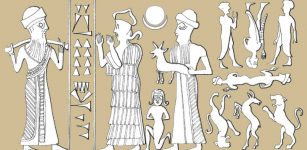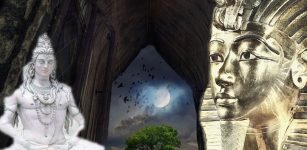Agni: Hindu God Of Divine Illumination And One Of The Three Supreme Deities Of Vedic Lore
A. Sutherland - AncientPages.com - Agni is the fire god, represented as red and two-faced (sometimes covered with butter), suggesting both his destructive and beneficent qualities and with black eyes and hair, three legs, and seven arms (rays).
Agni (right) with his son Skanda (Karttikeya), (dated to 1st-century AD.) Biswarup Ganguly - CC BY 3.0
Agni rides a ram or a chariot pulled by goats or, more rarely, parrots. Seven rays of light emanate from his body. One of his names is "Sapta jihva" (‘seven tongues'). He is worshipped under a triple form: fire on the earth, lightning, and the sun.
Agni, lord of the fire and power of heat and light, has its origin in Vedic lore and is one of the most important divinities in the Hindu pantheon.
It is said that in the Rig Veda, the earliest Sanskrit text, there are more hymns dedicated to Agni than to any other divinity. Agni is the demi-god ruling fire, (in Latin: ‘ignis’, which is the root of English, ignite).
Agni (also known as Agnideva), is sometimes considered to be the son of earth and sky and sometimes he is called the son of Angiras, a Vedic rishi (sage) of Hinduism and a teacher of divine knowledge, and also a messenger between men and gods.
In the system of five elements of nature, which is found in Vedas, there are Earth (bhumi), Water (jala), Air (Vayu), Space (aakash) and Fire (agni). Agni is the purest element since you can never try to contaminate Agni because when you touch Agni, he will turn you into ash.
Hindu priest performing Agni Pooja or Worship to Fire. Credit: Adobe Stock - korkorkusung
According to ancient Hindu beliefs, Agni dwelled in the two pieces of wood that could easily be transformed to fire when rubbed together. Therefore he represented a symbol of three powerful forces of nature – earthly fire, lightning, and sun.
Most popular among the fire gods, Agni was an important part of a home as the hearth fire, not only necessary for cooking food and heating water, but also served as the gathering place for the family.
He was considered a friend because his powers served people; he protected them, granted them wealth and length of life. Agni was called upon always to take the gods to the ritual place so that they can hear the praises of the chanters and their requests as well.
People have long celebrated the great god Agni (fire) during various festivals organized on a grand scale. One such beautiful festival of light is organized at Thiruvannamalai, Tamil Nadu.
However, Agni was not only associated with the hearth and earthly fire but also with sacrificial fire. It was later, he became much more as a purifier of sacrificial offerings rather than a fire god.
Agni on a ram. Credit: Public Domain
There is also yet another form of Agni, perhaps the most dangerous one. It is known as Vadavagni (literally Vadava-agni - “marefire”) and represents Agni’s most terrible form, which remains hidden deep under the sea. It’s waiting for the ‘right’ moment to destroy the world.
The Hindu scriptures mention an ancient belief that the escape of this fire from under the ocean which will, in the end, consume the current cycle of creation and prepare the universe for the next cycle of creation.
Later depictions of the god Agni show him in red or black color, with two faces, four hands, skin, which is red as fire flames, seven tongues for licking up the sacrificial butter, and a garland of fruit.
Another very interesting depiction of Agni shows him as Marut (immortal), one of the Hindu storm gods equipped with a flaming spear and riding in a chariot with wind instead of wheels and drawn with beautiful fiery horses.
Agni’s cult disappeared long ago but the ancient ceremonies associated with the fire still remain, keeping in mind the Hindu great deity – Agni, who grants immortality, purifies sinners after they died.
Also, participants of the funerals and wedding ceremonies never forget to call upon Agni.
Updated on June 21, 2021
Written by – A. Sutherland AncientPages.com Staff Writer
Copyright © AncientPages.com All rights reserved. This material may not be published, broadcast, rewritten or redistributed in whole or part without the express written permission of AncientPages.com
Expand for referencesMore From Ancient Pages
-
 Draupnir: God Odin’s Magical Ring That Could Multiply Itself
Featured Stories | Jul 26, 2017
Draupnir: God Odin’s Magical Ring That Could Multiply Itself
Featured Stories | Jul 26, 2017 -
 Controversial Artifact Fuente Magna Could Re-Write Ancient History – America’s Mysterious Rosetta Stone
Artifacts | Oct 18, 2014
Controversial Artifact Fuente Magna Could Re-Write Ancient History – America’s Mysterious Rosetta Stone
Artifacts | Oct 18, 2014 -
 Secrets Of The Bible: Codex Zacynthius – Hidden Text In New Testament May Soon Be Uncovered
Biblical Mysteries | Oct 7, 2014
Secrets Of The Bible: Codex Zacynthius – Hidden Text In New Testament May Soon Be Uncovered
Biblical Mysteries | Oct 7, 2014 -
 On This Day In History: Mount Tambora Volcano Begins A Three-Month-Long Eruption – On Apr 10, 1815
News | Apr 10, 2017
On This Day In History: Mount Tambora Volcano Begins A Three-Month-Long Eruption – On Apr 10, 1815
News | Apr 10, 2017 -
 Unique Heart-Shaped Jesuit Ring At Fort St. Joseph In Michigan
Archaeology | Sep 17, 2022
Unique Heart-Shaped Jesuit Ring At Fort St. Joseph In Michigan
Archaeology | Sep 17, 2022 -
 City Of Purushattum: Oldest Known Written Document Reveals History Of 4,500-Year-Old Silver City
Archaeology | Jun 4, 2017
City Of Purushattum: Oldest Known Written Document Reveals History Of 4,500-Year-Old Silver City
Archaeology | Jun 4, 2017 -
 Why Was Lovesickness A Feared Disease During The Middle Ages?
Ancient History Facts | Feb 8, 2018
Why Was Lovesickness A Feared Disease During The Middle Ages?
Ancient History Facts | Feb 8, 2018 -
 Golden Secrets Of Lake Guatavita And The Muisca People Gave Rise To The El Dorado Myth
Featured Stories | Nov 12, 2019
Golden Secrets Of Lake Guatavita And The Muisca People Gave Rise To The El Dorado Myth
Featured Stories | Nov 12, 2019 -
 Axis Mundi That Symbolizes Separation Of The Earth From The Heaven
Featured Stories | Jul 2, 2018
Axis Mundi That Symbolizes Separation Of The Earth From The Heaven
Featured Stories | Jul 2, 2018 -
 2,000-Year-Old Roman House Discovered In Malta
Archaeology | Jul 27, 2023
2,000-Year-Old Roman House Discovered In Malta
Archaeology | Jul 27, 2023 -
 Soap Was Invented In 2800 B.C By Babylonians
Ancient History Facts | Jun 17, 2016
Soap Was Invented In 2800 B.C By Babylonians
Ancient History Facts | Jun 17, 2016 -
 Siberian Shigir Idol With Seven Faces Is The World’s Oldest Wooden Sculpture
Archaeology | Sep 1, 2015
Siberian Shigir Idol With Seven Faces Is The World’s Oldest Wooden Sculpture
Archaeology | Sep 1, 2015 -
 Mysterious El Caracol At Chichen Itza: What Did Maya Astronomer-Priests Observe In The Sky?
Archaeoastronomy | May 24, 2019
Mysterious El Caracol At Chichen Itza: What Did Maya Astronomer-Priests Observe In The Sky?
Archaeoastronomy | May 24, 2019 -
 Migrants From Turkey And Greece Arrived In Britain Some 6,000 Years Ago
Archaeology | Apr 16, 2019
Migrants From Turkey And Greece Arrived In Britain Some 6,000 Years Ago
Archaeology | Apr 16, 2019 -
 Zuni Indians Bravely Fought For Their Ancient Culture, Traditions And Respect For Their Ancestors
Featured Stories | Mar 14, 2018
Zuni Indians Bravely Fought For Their Ancient Culture, Traditions And Respect For Their Ancestors
Featured Stories | Mar 14, 2018 -
 Prehistoric Swiss Army Knife Shows How Early humans Communicated
Archaeology | Jun 9, 2022
Prehistoric Swiss Army Knife Shows How Early humans Communicated
Archaeology | Jun 9, 2022 -
 On This Day In History: Statue Of Venus de Milo Is Discovered On The Aegean Island Of Milos – On Apr 8, 1820
News | Apr 8, 2016
On This Day In History: Statue Of Venus de Milo Is Discovered On The Aegean Island Of Milos – On Apr 8, 1820
News | Apr 8, 2016 -
 On This Day In History: American Archaeologist George A. Reisner Was Born – On Nov 5, 1867
News | Nov 5, 2016
On This Day In History: American Archaeologist George A. Reisner Was Born – On Nov 5, 1867
News | Nov 5, 2016 -
 Giant Bath Tub Built For Tsar Alexander I – Why Was It So Large?
Featured Stories | Jul 11, 2018
Giant Bath Tub Built For Tsar Alexander I – Why Was It So Large?
Featured Stories | Jul 11, 2018 -
 Ancient Tombs Arranged In The Image Of A Galaxy Discovered In Sudan
Archaeology | Jul 8, 2021
Ancient Tombs Arranged In The Image Of A Galaxy Discovered In Sudan
Archaeology | Jul 8, 2021



